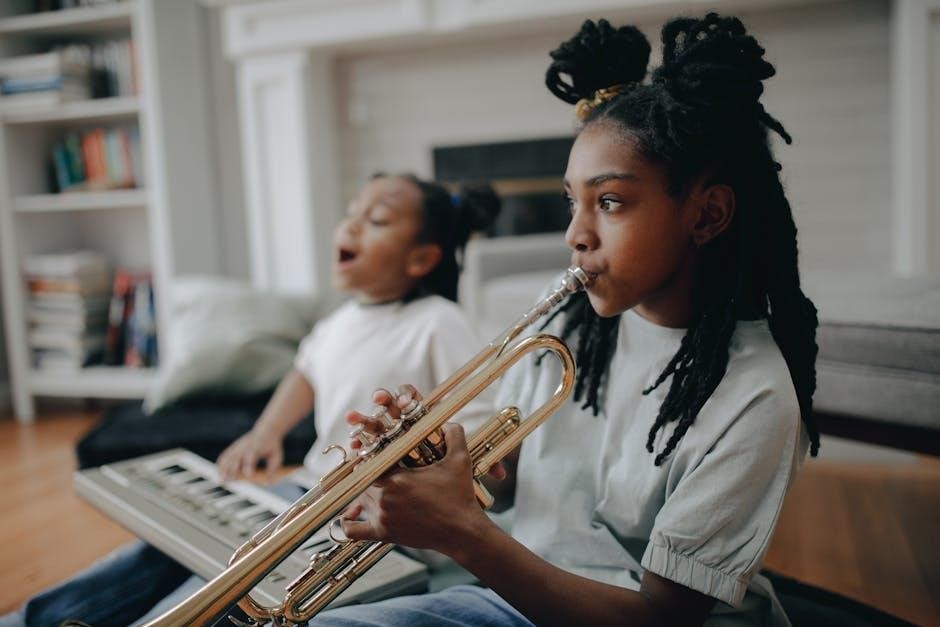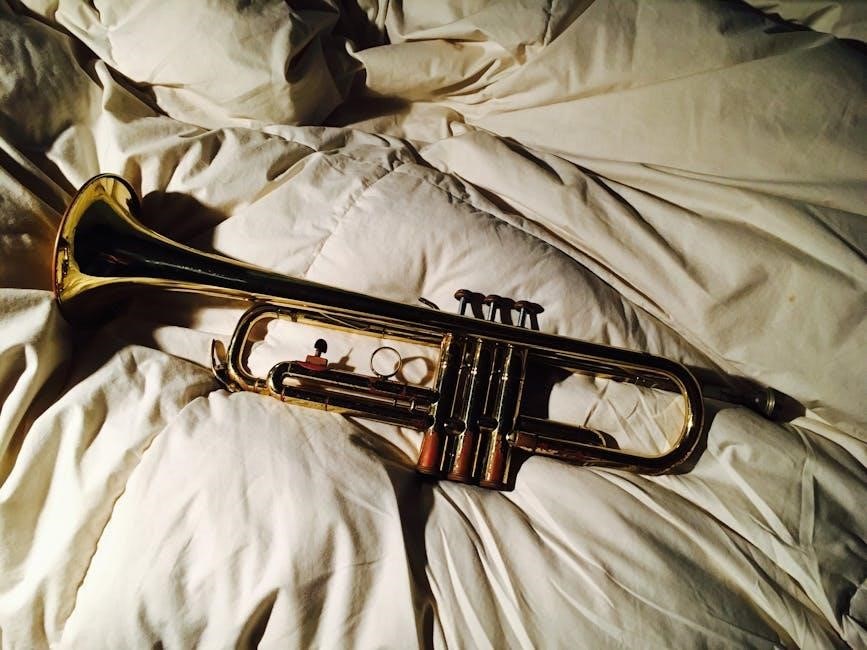
clarke studies trumpet pdf
Herbert L. Clarke was a renowned trumpeter and educator whose technical studies revolutionized brass education. His comprehensive exercises, available as free PDF downloads, focus on finger dexterity, tone production, and breath control, offering timeless benefits for musicians.
Understanding the Importance of Clarke’s Technical Studies
Clarke’s Technical Studies are a cornerstone of trumpet education, offering a comprehensive approach to developing technique and musicianship. The exercises focus on finger dexterity, tone production, and breath control, providing a structured path for improvement. Their timeless relevance lies in their ability to balance technical rigor with musical depth, making them indispensable for players seeking mastery and emotional expression in performance.
The Evolution of Clarke’s Methodology in Trumpet Playing
Herbert L. Clarke’s methodology has stood the test of time, evolving from its 1912 publication into a timeless resource for trumpet education. His studies, now widely available as free PDF downloads, emphasize technical precision and musicality, adapting to modern teaching practices while retaining their foundational principles. Clarke’s approach remains essential for developing finger dexterity, tone production, and breath control, ensuring its relevance in contemporary trumpet instruction.
Structure and Content of Clarke’s Technical Studies for the Cornet
Clarke’s Technical Studies for the Cornet includes 190 exercises designed to enhance technique and musicianship. The studies, available as free PDF downloads, systematically improve finger dexterity, tone production, and breath control, providing a structured approach for cornet and trumpet players to master their craft.
Overview of the 190 Exercises and Their Progression
Clarke’s Technical Studies for the Cornet comprises 190 exercises, progressing from basic to advanced techniques. The studies systematically develop finger dexterity, tone production, and breath control, with dynamic markings and tempo adjustments. Each exercise builds on the previous one, ensuring a structured approach to mastering technical and musical skills. The progression is designed to challenge players gradually, fostering overall musicianship and versatility.
How the Studies Address Finger Dexterity, Tone Production, and Breath Control
Clarke’s studies systematically enhance finger dexterity through intricate passages and arpeggios. Tone production is refined via exercises emphasizing precise articulation and phrasing. Breath control is developed through extended phrases, requiring sustained notes and dynamic contrasts. These targeted exercises ensure a well-rounded technical foundation, essential for mastering both classical and modern trumpet repertoire with precision and musicality.

Key Elements of Clarke’s Technical Studies
Clarke’s studies focus on finger dexterity, tone production, and breath control through structured exercises. They emphasize technical precision, musicality, and versatility, benefiting trumpeters and other brass instrumentalists significantly.
Finger Dexterity Exercises and Their Role in Trumpet Technique
Clarke’s exercises are designed to enhance finger agility and coordination, essential for mastering complex trumpet passages. These etudes progressively challenge players, improving accuracy and speed while ensuring precise intonation and control. Regular practice of these studies fosters technical proficiency, enabling musicians to tackle demanding repertoire with confidence and precision, making them indispensable in trumpet education.
Tone Production Techniques Emphasized in the Studies
Clarke’s studies emphasize the development of a rich, resonant tone through precise breath control and embouchure formation. Players are guided to avoid forcing the tone, ensuring natural resonance and clarity. Dynamic markings are included to refine phrasing and expression, fostering a balance between technical precision and musicality, essential for producing a polished and professional sound;
Practices for Developing Breath Control and Endurance
Clarke’s studies emphasize breath control through exercises requiring extended phrases played in one breath. Players are advised to practice each study 8 to 16 times in a single breath, fostering stamina and consistent airflow. The exercises gradually increase in difficulty, helping to build endurance while maintaining tone quality and musicality, essential for advanced trumpet performance.
Versatility of Clarke’s Studies for Different Instruments
Clarke’s studies are versatile, benefiting not only trumpet players but also clarinetists, flugelhorn players, and other brass instrumentalists, making them a valuable resource for diverse musical applications.
Adaptation of the Studies for Clarinet Players
Clarke’s studies are highly adaptable for clarinet players, as the principles of finger dexterity, tone production, and breath control apply across wind instruments. The exercises, originally for cornet, translate effectively to clarinet technique, offering a versatile tool for improving musicianship. This cross-instrumental relevance makes Clarke’s studies a valuable resource for both brass and woodwind musicians, enhancing their technical and musical skills.
Relevance of the Exercises for Flugelhorn and Other Brass Instruments
Clarke’s studies are equally beneficial for flugelhorn and other brass instruments due to their focus on technical rigor and musical depth. The exercises enhance finger dexterity, breath control, and tonal clarity, making them adaptable for various brass instruments. Their versatility ensures that players can refine their skills across different brass families, from flugelhorn to trombone, with the same effectiveness as on trumpet or cornet.

Historical Significance and Popularity of Clarke’s Technical Studies
Clarke’s studies, first published in 1912, remain a cornerstone of brass education, blending technical rigor with musical depth, ensuring their enduring relevance and popularity among players and educators worldwide.
How Clarke’s Work Has Stood the Test of Time
Clarke’s Technical Studies, first published in 1912, remain a cornerstone of brass education due to their balanced approach to technical skill and musicality. The exercises, now widely available as free PDF downloads, address finger dexterity, tone production, and breath control, ensuring their relevance across generations. Their adaptability to instruments like the clarinet and flugelhorn further solidifies their timeless appeal, making them indispensable for modern musicians.
Why the Studies Remain a Favorite Among Trumpet Educators
Clarke’s studies are cherished for their versatility, structured progression, and focus on both technical mastery and musicality. Educators value their adaptability to various instruments and ability to enhance finger dexterity, tone, and breath control. The comprehensive approach ensures well-rounded development, making them indispensable in modern trumpet education and a favorite among instructors seeking balanced skill growth in their students.
Approach to Practicing Clarke’s Technical Studies
Respect dynamic markings to avoid fatigue and maintain breath control. Practice each exercise 8–16 times in one breath, keeping lips and fingers flexible. Avoid forcing tone to prevent embouchure strain, ensuring a controlled, gradual approach to technical mastery.
Dynamic Markings and Avoiding Fatigue
Clarke’s studies emphasize adhering to dynamic markings to prevent fatigue and strain on the lips and embouchure. Players should avoid forcing the tone and maintain controlled breath support. Practicing each exercise 8–16 times in one breath helps build endurance without overexertion. Staying within the indicated dynamics ensures sustainable progress and prevents long-term injury, allowing for a balanced approach to technical development and musical expression.
Importance of Flexible Lips and Fingers During Practice
Clarke’s studies stress maintaining flexible lips and fingers to enhance technical accuracy and musicality. Players should avoid stiffness, as it hinders dexterity and tone consistency. Practicing with relaxed embouchure and fingers ensures smooth transitions between notes, fostering precise articulation and fluid phrasing. This approach prevents fatigue and supports long-term technical development, aligning with Clarke’s emphasis on balanced practice routines.

Clarke’s Studies in Modern Trumpet Education
Clarke’s studies remain a cornerstone in modern trumpet education, offering timeless exercises that adapt seamlessly to contemporary teaching methods. Their relevance endures, making them indispensable for today’s musicians.
Integration of Clarke’s Methods in Contemporary Teaching
Clarke’s studies remain a cornerstone in modern trumpet education, blending technical rigor with musical depth. Educators integrate his exercises into contemporary curricula, emphasizing their adaptability to current teaching methods. The studies’ focus on finger dexterity, tone production, and breath control aligns with modern pedagogical approaches, ensuring their continued relevance and effectiveness in fostering both technical mastery and emotional expression in players.
How Modern Players Benefit from These Timeless Exercises
Modern players gain a strong foundation in technique and musicianship through Clarke’s studies. The exercises enhance finger dexterity, tone quality, and breath control, while fostering musical expression. Their adaptability to various teaching methods ensures relevance, making them indispensable for developing both technical mastery and emotional connection in contemporary brass performance, remaining a vital resource for aspiring musicians.

Availability and Access to Clarke’s Studies in PDF Format
Clarke’s Technical Studies are widely available as free PDF downloads online, with sources like trumpetcollege.com and trumpetworx.com offering easy access for musicians to enhance their practice.
Where to Find Free PDF Downloads of Clarke’s Technical Studies
Clarke’s Technical Studies can be downloaded for free as PDFs from various online sources, including trumpetcollege.com and trumpetworx.com. These websites offer direct links to the studies, ensuring easy access for musicians. Additionally, many music education platforms and forums provide downloadable versions, making it convenient for trumpet players to practice and improve their skills with these timeless exercises.
Recommendations for Supplementary Materials and Resources
Supplement Clarke’s studies with Arban’s Conservatory Method and Cichowicz Flow Studies for a well-rounded approach. Visit websites like TrumpetStudio.com for additional resources, including MIDI files and mouthpieces. These materials enhance technical mastery and musicality, providing a comprehensive toolkit for trumpet players seeking to elevate their skills alongside Clarke’s timeless exercises.

The Role of Clarke’s Studies in Trumpet Method Books
Clarke’s studies complement other method books like Arban’s, offering unique exercises that enhance technical precision and musicality. Their integration with modern techniques ensures relevance in contemporary trumpet education;
Comparison with Other Trumpet Method Books Like Arban’s Conservatory Method
Clarke’s studies complement Arban’s method by focusing on technical precision and musicality. While Arban’s emphasizes a broader range of techniques, Clarke’s exercises provide in-depth finger dexterity and breath control, making them a valuable supplement. Together, they form a comprehensive approach to trumpet education, ensuring well-rounded development for aspiring musicians.
How Clarke’s Studies Complement Other Trumpet Techniques
Clarke’s studies serve as a valuable supplement to other trumpet methods, offering detailed exercises for finger dexterity, tone production, and breath control. They enhance technical precision and musicality, filling gaps in other systems. By integrating Clarke’s exercises, players gain a more comprehensive skill set, ensuring a well-rounded musical education that complements modern and classical trumpet techniques effectively.

Clarke’s Studies and Their Application to Music Theory
Clarke’s studies enhance technical and musical skills by incorporating scales, arpeggios, and rhythmic patterns, providing a foundation in music theory. Players develop a deeper understanding of melody and harmony through these exercises, which are essential for advanced performance and interpretation.
Understanding the Musical Depth of the Exercises
Clarke’s studies delve into scales, arpeggios, and rhythmic patterns, fostering technical mastery. They emphasize phrasing, dynamics, and articulation, nurturing musicality and emotional expression. Available as free PDF downloads, these exercises connect theoretical concepts to practical performance, offering a holistic approach to trumpet education and artistic development for players at all levels.
How the Studies Enhance Both Technical and Musical Skills
Clarke’s studies enhance technical proficiency through rigorous exercises targeting finger dexterity, tone consistency, and breath control. Musically, they emphasize dynamics, phrasing, and articulation, fostering emotional expression. By integrating technical rigor with musical depth, the studies ensure well-rounded development, preparing players for professional performances and inspiring artistic growth, as highlighted in the free PDF resources available online.
The Emotional Connection in Clarke’s Studies
Clarke’s studies foster an emotional connection by linking technical mastery to musical expression, enabling players to convey depth and passion through their performance, enriching their artistic experience.
Developing Musicality Through Technical Mastery
Clarke’s studies bridge technique and artistry by integrating intricate exercises with expressive phrasing. By mastering finger dexterity and breath control, musicians unlock the ability to convey emotion and nuance, transforming technical proficiency into compelling performances. This harmony between skill and expression fosters a deeper connection to the music, enriching both the player’s and listener’s experience profoundly.
Building an Emotional Connection with the Music
Clarke’s studies emphasize the importance of emotional expression, encouraging players to transcend technical execution. By refining tone and phrasing, musicians develop a profound emotional connection, allowing their performances to resonate deeply with audiences. This integration of technique and feeling creates a meaningful bond between the player, the music, and the listener, enhancing the overall musical experience.
Clarke’s Studies and Their Impact on Trumpet Performance
Clarke’s studies prepare players for professional performances by enhancing technical mastery, breath control, and musicality, ensuring a strong foundation for success in various musical settings and genres.
How the Studies Prepare Players for Professional Performances
Clarke’s studies build the technical mastery, tone consistency, and breath control essential for professional performances. The exercises enhance finger dexterity, precision, and musicality, enabling players to tackle complex repertoire with confidence and artistry, ensuring they meet the demands of high-pressure musical environments.
Success Stories of Trumpet Players Who Used Clarke’s Studies
Many renowned trumpet players attribute their success to Clarke’s studies. Artists like Chris Botti and Alison Balsom have credited these exercises with improving their technical mastery and musicality. The studies’ focus on precision and tone production has enabled professionals to excel in diverse genres, from classical to jazz, showcasing the timeless value of Clarke’s method in achieving artistic excellence.
Herbert L. Clarke’s Technical Studies remain a cornerstone of trumpet education, offering unparalleled exercises for technique and musicianship. Available as free PDF downloads, they continue to inspire and empower musicians worldwide, ensuring Clarke’s legacy endures in modern music education and performance.
Summarizing the Value of Clarke’s Work for Trumpet Players
Herbert L. Clarke’s Technical Studies are a cornerstone of trumpet education, offering comprehensive exercises that enhance technique, tone, and breath control. Available as free PDF downloads, these studies provide timeless value, adapting to modern instruments and educational needs. Their focus on finger dexterity, tone production, and musicality ensures they remain indispensable for players seeking mastery and artistry in trumpet performance.
Encouraging Continued Use of the Studies in Modern Music Education
Clarke’s Technical Studies remain vital in modern music education due to their timeless relevance and adaptability. The exercises effectively develop technical proficiency while fostering musicality, aligning with contemporary teaching methods. Their availability as free PDF downloads enhances accessibility, making them an invaluable resource for educators and students alike. Integrating these studies into today’s curriculum ensures a solid foundation for trumpet players, bridging traditional techniques with modern performance demands.